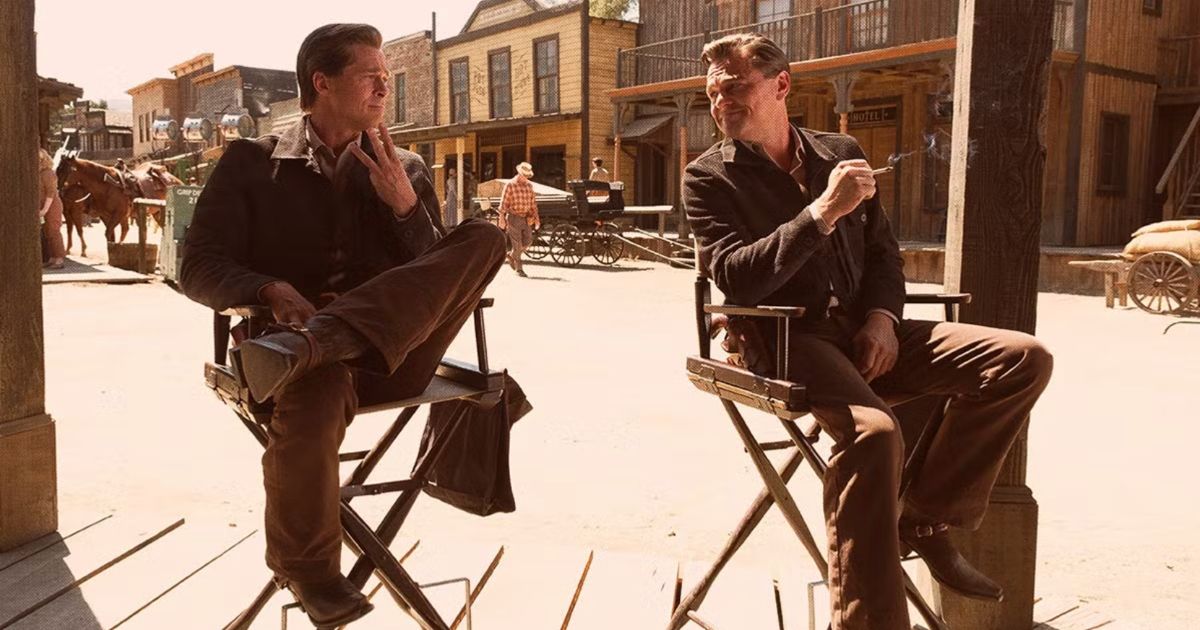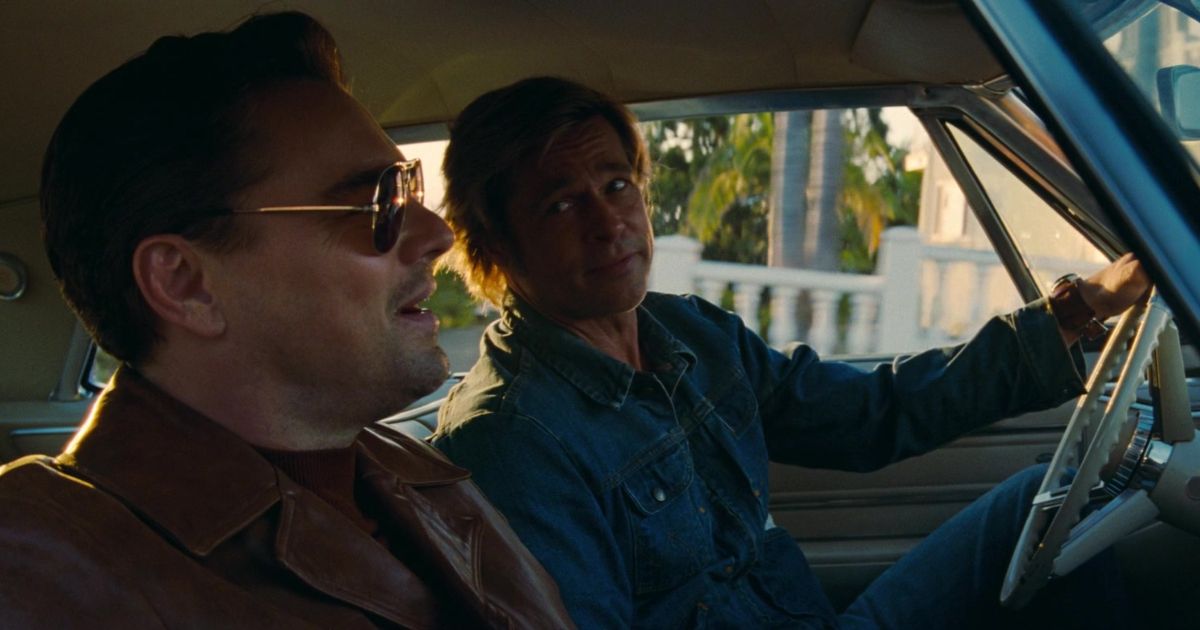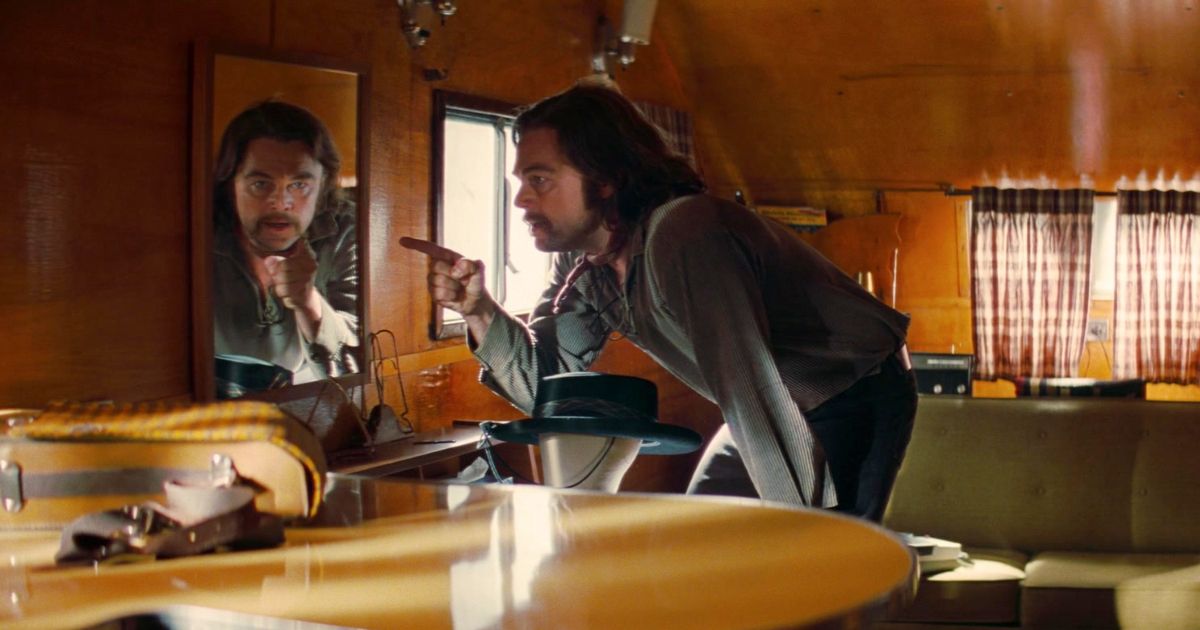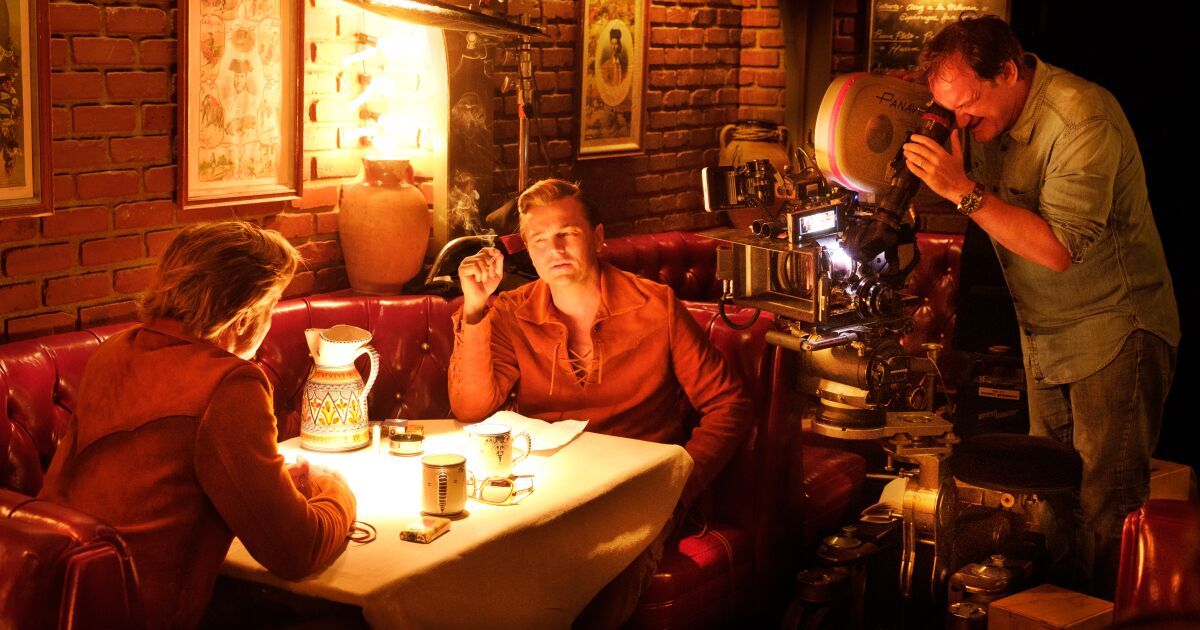The wait is nearly over for fans of the next chapter of Quentin Tarantino’s career. HarperCollins is about to publish the Pulp Fiction director’s long-teased, first official work of film criticism, Cinema Speculation. The book, concerning the movies that young QT grew up watching in the 1970s, comes on the heels of his foray into writing explicitly for the page with last year's novelization of Once Upon a Time in Hollywood (also published by HarperCollins), which was met with positive reviews upon its release.
Between his nearly three-hour film in 2019 and subsequent 400-page novelization of the same name in 2021, it would seem that Quentin Tarantino has milked Once Upon a Time in Hollywood for all it's worth, leaving no stone unturned in the tale of alcoholic TV cowboy, Rick Dalton (played hysterically by Leonardo DiCaprio in the film) and his devilishly handsome stunt double, Cliff Booth (played to Best Supporting Oscar gold by Brad Pitt). And yet, the filmmaker turned author somehow neglected the opportunity to give his fans what could have been the best part of the movie and the novel: Rick and Cliff’s time in Rome shooting Spaghetti Westerns.
Both the Film and Novel Skipped Over Rick Dalton and Cliff Booth’s Misadventures in Italy
One of the first scenes in the film (and the very first in the novel) concerns actor Rick Dalton meeting with producer Marvin Schwarz (played effortlessly by Al Pacino in the film), who tells the Hollywood has-been that his only ticket to pull his career out of the toilet is to fly to Rome and star in Spaghetti Westerns; a career-move often made by real Hollywood actors throughout the 1960s and 1970s like Clint Eastwood, Lee Van Cleef, and Anthony Quinn to name a few. Unable to cope with this reality, Rick throws a hilarious temper tantrum which only his best buddy Cliff is able to talk him down from, reassuring the egotistic actor that, “Going to Rome to star in movies does not sound like the fate worse than death that you seem to think it is.”
At this early stage in the story, a filmgoer (or reader) would not be misguided to assume that they will witness the inevitable: Rick and Cliff flying to Rome and shooting Spaghetti Westerns. But in the film, when the time comes for the duo’s five-month sojourn in the Italian film industry, Tarantino fast-forwards right through it. A few lines of narration from Kurt Russell only hints at the good, the bad, and the ugly experiences they had in Europe, saying:
“[Rick] didn’t love the Italians’ way of making movies. He thought the post-synced, ‘every actor speaks their own language’, Tower of Babel shooting style of European movies was ridiculous.”
This post-synched, multi-language dialogue was the custom at Cinecittà, the studio in Rome which pumped out Spaghetti Westerns like butter throughout the '60s and '70s. But Tarantino’s film barely scratches the surface of the humor that could arise from an international cast of actors who can’t even understand one another’s lines, let alone make small talk over lunch. Epic as the film’s length may be, any story intended to be viewed in one sitting can only go into so much detail. Cuts must be made. Yet, in the novelization, Tarantino doubled down, again summarizing Rick and Cliff’s time in Rome with a few quick lines.
There is one exception, however; just a tiny bit more that Tarantino gives us. In the twenty-second chapter of the novel, Cliff talks to real-life Hollywood has-been and major-league alcoholic Aldo Ray in “the closest motel to the Wild West-looking rock formations that manage to make Almeria, Spain, pass for Arizona” (Tarantino 342). In the brief dialogue scene, Cliff recounts how he got hit in the eye with the butt of a rifle while filming a stunt with an Italian amateur actor playing a Mexican bandito... And that’s pretty much it.
The Italian Film Industry of the 1960S Was a Wild West Unto Itself
Compared to the streamlined Hollywood studio system, Cinecittà was a Wild West unto itself, which the fictional Rick Dalton displayed zero interest in braving. While filming a scene in the seminal Spaghetti Western, The Good, the Bad, and The Ugly (1966), the real-life actor Eli Wallach was nearly beheaded by a train. Luckily, he survived and lived to the age of 98. (What would the 2006 rom-com, The Holiday, have done without that cameo?)
Similarly, while shooting the Civil War sequence from the same film, Clint Eastwood refused Sergio Leone’s direction to go down by the bridge during the shot in which it explodes. Why? Because Spaghetti Western filmmakers like Leone did not rig up squibs for on-screen explosions. They used real dynamite. Just picture Rick Dalton acting opposite some German actor, like Klaus Kinski, who loses his head, literally. Right before Rick's eyes. Cliff would have his work cut out, calming Rick down and wiping Kinski’s blood off of him.
If the movie gods be good, then Tarantino has a scene lying on the cutting room floor wherein Rick repeatedly fails to get through a monologue, not because he had eight whiskey sours the night before, but because he keeps getting distracted by the banging of hammers and winding of drills on the set being constructed right next to him.
Tarantino Has Revealed at Least One Chapter for a Sequel Novel to Once Upon a Time in Hollywood
So, the million-dollar question: Did Tarantino really set up a perfect fish-out-of-water story only to sidestep it? Twice? Or does QT have another trick up his sleeve? The odds of a Once Upon a Time in Hollywood film sequel are slim to none since Tarantino and DiCaprio don't make sequels to their films (Kill Bill Vol. 1 & 2 was originally conceived as one epic film, though he's teased a Vol. 3 for years.) And apart from Steven Soderbergh’s Ocean’s Trilogy, Pitt doesn't make sequels either. Could Tarantino instead be tucking Rick and Cliff’s misadventures in Rome in his back pocket for a Spaghetti Western sequel to the novel? While there has not been any official announcement about a sequel novel, Tarantino has already fleshed out at least one chapter for such a book.
In an interview last year for Django & Django (2021) with The Hollywood Reporter, an Italian documentary about Spaghetti Western director Sergio Corbucci, Tarantino went into great detail about a chapter in which Rick Dalton, accompanied by producer Marvin Schwarz, has dinner with Corbucci and his wife, Nori. Though this dinner is essentially an audition for Rick to land the lead role in the director’s next movie, Rick repeatedly embarrasses himself by accidentally insulting Sergio Corbucci’s previous films and confusing him with “The Other Sergio,” Sergio Leone.
Tarantino’s New Book Is His First Work of Nonfiction
Should Tarantino actually get a sequel novel down on paper for Once Upon a Time in Hollywood, it would likely be years down the road before it reaches the hands of readers since he has teased other endeavors such as playwriting, novelizations of Reservoir Dogs and other films of his, and, eventually, making his tenth film which he has repeatedly claimed will be his last.
In the meantime, fans of Once Upon a Time in Hollywood can keep their appetites at bay with Cinema Speculation. Quentin Tarantino’s first work of nonfiction is currently available to pre-order online, with HarperCollins set to have it on bookstore shelves this November 1st.





-by-Quentin-Tarantino.jpg)